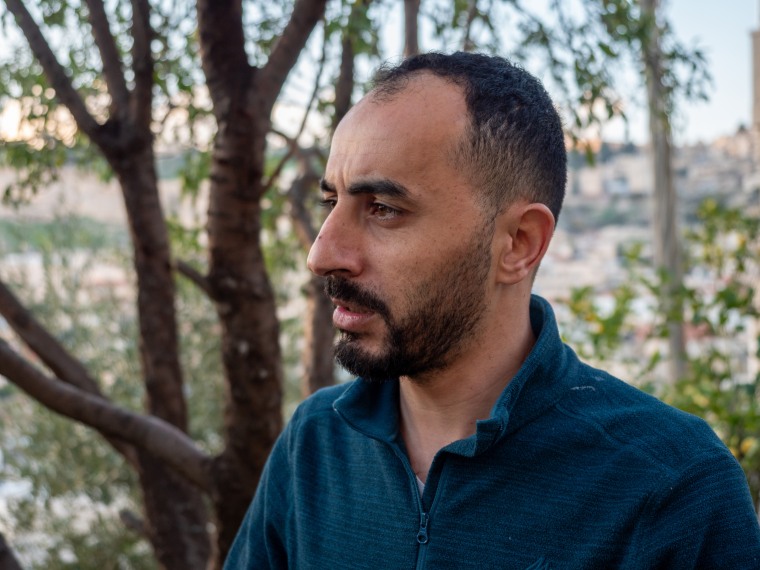Abuse and revenge allegations spike in Israeli prisons since Oct. 7
JERUSALEM — Abuses against Palestinians held in Israeli jails have risen since Hamas‘ Oct. 7 attacks, former detainees and rights organizations have warned, with one group alleging that prison officers are taking “revenge” on inmates for the militant group’s atrocities.
Data compiled by Israeli rights group HaMoked said the number of “security inmates” — prisoners detained on grounds of national security — had jumped 66% to 8,600 in January from 5,192 in October, adding the majority are Palestinians. The Israel Prison Service did not respond when asked for prisoner numbers.
One security inmate was Ramzi Abbasi, 30, who was arrested last spring and accused of communicating with a Hamas-affiliated group — charges he denies.
He said life in Ktzi’ot Prison became progressively worse after 1,200 Israelis were killed and 240 taken hostage during Hamas’ multipronged attacks on Israel. Israeli officials say around 100 people still remain in captivity after scores were released in late November as part of an exchange for Palestinian prisoners. More than 25,000 people have been killed since Israel launched its military assault on Gaza, according to the enclave’s health ministry.
“Our life became zero. We didn’t mean anything to them,” Abbasi, now released, said in the backyard of his east Jerusalem home overlooking the Old City. “They treated us less than the animals. Beating, abusing, torturing, everything you could imagine.”

“I was sexually harassed,” he said, adding he also witnessed guards sodomize his cellmates with truncheons. NBC News has not been able to corroborate his allegations.
Prisoners were regularly stripped naked and piled on top of each other for the guards’ amusement, he said. “They were happy, enjoying what they were doing to us,” he said, adding that none of the abuse seemed aimed at extracting information or a confession.
Abbasi, a physiotherapist, said he was released in November one month early, to make room for the huge numbers of inmates arrested by Israel after Oct. 7.
The Israel Prison Service said in a statement to NBC News last month that they were “not aware” of Abbasi’s complaints and that “as far as we know, no such events have occurred.” It did not comment when asked why he was released.
The prison service has acknowledged that it made recent changes. In a statement published shortly after the attacks in October, officials said they “decided to reduce the living conditions of the security prisoners” like Abbasi.
The new policy means such prisoners would “enter a ‘locked’ state (closed in cells), reduce movements and prevent contact with the outside world,” the statement said, adding the measures were meant to take “into account the exceptional security situation prevailing in the country.”
Rights groups say the “security prisoner” designation is broad and can apply to crimes ranging from stone throwing to handling explosives and aiding and abetting terrorists. Israel’s prison service did not respond to an NBC News request to define the charge.
The statement was released on Oct. 17, the day before Israeli lawmakers passed emergency legislation allowing prisoners to be housed in conditions that would be otherwise considered illegal. This was extended by the country’s National Security Committee last month.
Abbasi’s complaints echo those of other prisoners and rights groups who have long condemned Israel’s treatment of detainees, but say that prison conditions have deteriorated since the attacks.
“What we’ve seen in the prison service now is revenge,” said Tal Steiner, an attorney and the executive director of the Public Committee Against Torture in Israel, an Israeli nongovernmental organization that monitors the treatment of Palestinian prisoners.
“There is a sense in the system that things are more allowed — that expressing that anger towards them, that vengefulness, is somehow allowed,” she said, adding that her organization had received reports from prisoners about sexual assault, humiliation and degradation while they were behind bars.

Asked about these comments, a prison service spokesperson said it “operates according to the provisions of the law,” and “all basic rights required are fully applied.”
Steiner said some of the measures could be explained by having to handle more prisoners, “but other things, other phenomenons that we’ve seen … sexual assault, humiliation and degradation, what…
Read More: Abuse and revenge allegations spike in Israeli prisons since Oct. 7

